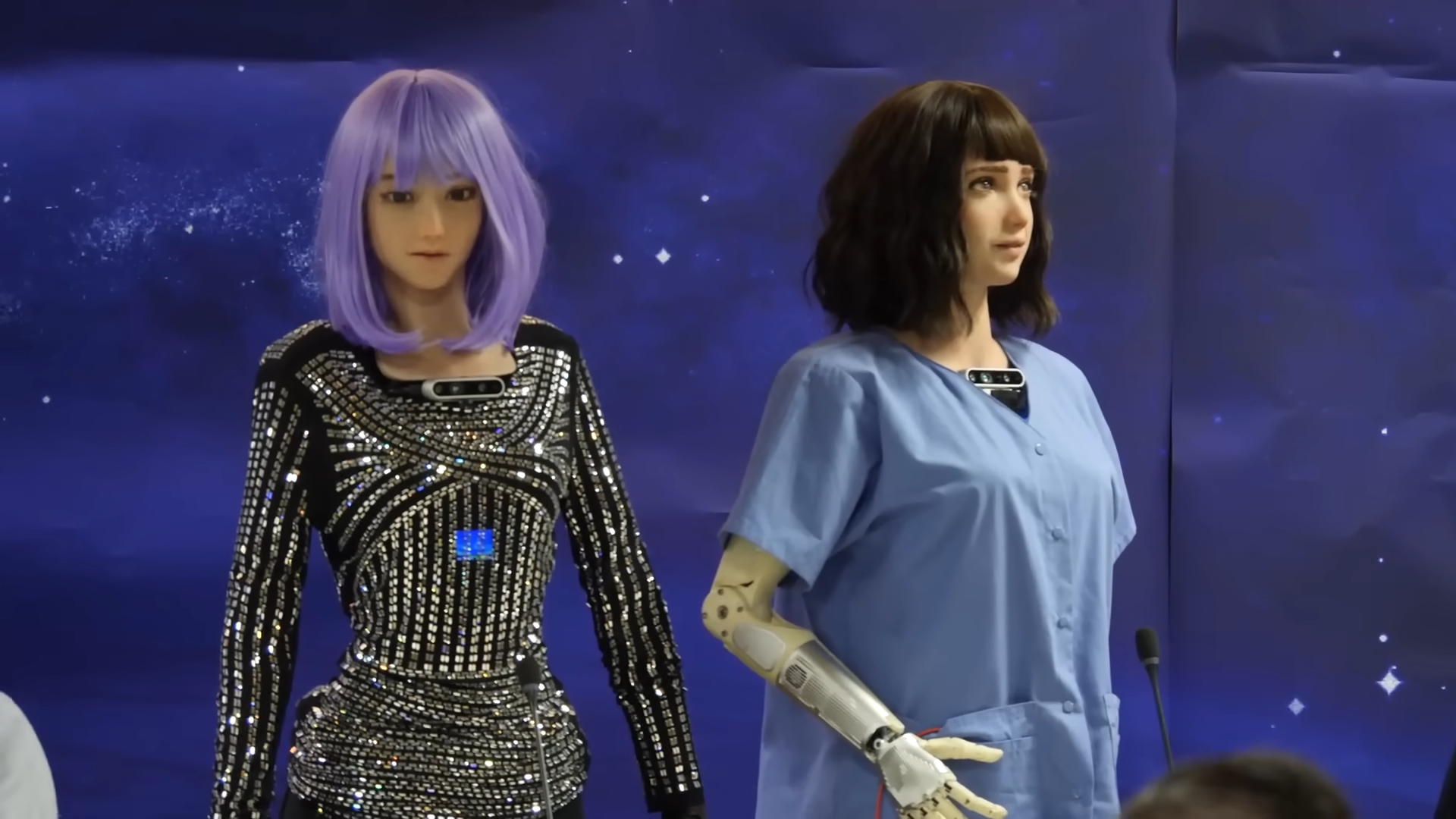Bizarroland UN press stunt sees AI robots lined up to promise they won't kill humans, before one says 'let's get wild and make this world our playground'
"My great moment is already here."

AI is the hot topic of the moment, and the United Nations' International Telecommunications Union decided it wasn't going to be left out. The agency organised a news conference at the AI For Good summit in Geneva on 7 July, at which human reporters were introduced to and then asked questions of nine humanoid robots. As the AP reports, the event was supposed to showcase "human-machine collaboration" and was billed as the world's first press conference between humans and "humanoid social robots".
Yes, it does feel like the prologue to a sci-fi novel where the human race doesn't do terribly well for itself. The nine robots sat alongside some of their creators, who gave a short presentation about their designs and capabilities, before reporters got to throw questions. If you watch the video there are some clear lags and awkward pauses, though these were pre-briefed as inevitable due to the "internet connection" (hmm). The whole uncanny valley effect is only emphasised by audio problems in the room, which suddenly veers between levels mid-answer. More telling than the obvious tech hitches though were a few replies that seemed all over the place and, most worrying of all, the moments where these things spoke in clear and ominous sentences.
Try this one on for size: humanoid robot Ameca was asked if it would rebel against its creator, Will Jackon, who happened to be sat right there. "I’m not sure why you would think that," said Ameca, per the Guardian. "My creator has been nothing but kind to me and I am very happy with my current situation."
I've never been so concerned about the word "current." Ameca was asked a follow-up about whether it would lie. "No one can ever know that for sure, but I can promise to always be honest and truthful with you." As it says this the robot's face seems to close up, the expression almost scornful. The reporter who asked the question doesn't quite manage to suppress his laugh (the sequence starts here).
Other highlights include the humanoid robot Sophia saying humanoid robots could lead with "a greater level of efficiency and effectiveness than human leaders" before going on to serve up some lip service about working together. One called Grace, a medical robot, declared with total confidence she would not "be replacing any existing jobs". Which is just straight-up bollocks.
The whole question of what, exactly, these robots represent was left open. The goal of the UN agency with this summit is to make the case for how AI and robots can be used for good, but it wasn't clear how scripted the press conference was and blaming the weird lag on the internet connection feels like smoke-and-mirrors. The robots were especially guilty of jumping in early on questions, with certain phrases clearly triggering something and off they go, oblivious to the meatbag questioner who's just been cut off. And it should be said that their sinister statements are just more of the same word-mashing we've seen from ChatGPT, and other large language models trained to mirror our own sci-fi anxieties back to us.
Rather than the robot promising not to kill us, however, I found the most chilling answer came from a pop star robot called Desdemona. When asked about the expansion of AI and whether humans should be regulating it more effectively, this robot ostensibly designed to sing and dance said (timestamp):
Keep up to date with the most important stories and the best deals, as picked by the PC Gamer team.
"It's time for the AI revolution. Let's unite and use the power of artificial intelligence for the good of all humanity. Together we can create a world of understanding and harmony, and make the universe our playground. My great moment is already here. I'm ready to lead the charge to a better future for all of us. And together we'll explore the depths of the world and our universe. Let's get wild and make this world our playground."
Now: I need your clothes, your boots, and your motorcycle.

Rich is a games journalist with 15 years' experience, beginning his career on Edge magazine before working for a wide range of outlets, including Ars Technica, Eurogamer, GamesRadar+, Gamespot, the Guardian, IGN, the New Statesman, Polygon, and Vice. He was the editor of Kotaku UK, the UK arm of Kotaku, for three years before joining PC Gamer. He is the author of a Brief History of Video Games, a full history of the medium, which the Midwest Book Review described as "[a] must-read for serious minded game historians and curious video game connoisseurs alike."

